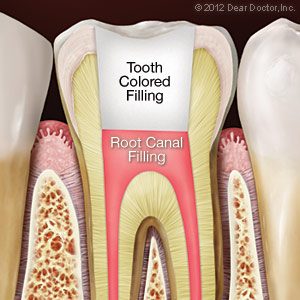If you have been experiencing problems with a tooth, you may wonder, “Do I need a root canal?”
Root canals, also known as endodontic therapy, are performed when the nerve or pulp of the tooth becomes infected and inflamed due to dental decay, a cracked or broken tooth or an injury to the tooth, according to the American Dental Association. During the procedure, a dentist uses a drill to remove both the nerve and pulp and seals up the tooth to protect against further damage. Only your dentist can determine whether a root canal will adequately treat your problem. Here are a few possible symptoms of the need for a root canal and some steps for dealing with them.
General Possible Symptoms
The most common symptom that may indicate the need for a root canal is tooth pain, according to the American Association of Endodontists. The intensity of the pain can range from mild to severe; it may lessen or intensify throughout the day, or it may get worse only when you bite down on the tooth. Some patients experience prolonged sensitivity to hot food or liquids. Your gums may also feel tender and swollen near the problem area.
First Steps
If you notice any of the above symptoms, contact your local dentist right away. Explain your symptoms by phone to a staff member, who may arrange for you to come in right away or may recommend emergency care depending on the severity of your symptoms. To soothe the pain and alleviate swelling, apply an ice pack to the outside of your jaw.
Steps Your Dentist Will Take
When you come in for your appointment, your dentist will examine your tooth and take X-rays in order to diagnose the cause of your problem. After proper examination, your dentist will be able to tell you the best course of action to resolve your symptoms or ask you to visit an endodontist, a specialist who treats nerve damage to the teeth. Depending on the cause of the problem, your dentist may recommend a root canal or a completely different and possibly less invasive dental procedure on what is diagnosed.
Only your dentist can answer the question: “Do I need a root canal?”
Call your dentist right away if you notice tooth pain, swelling or tenderness to get on the right track towards treatment.

